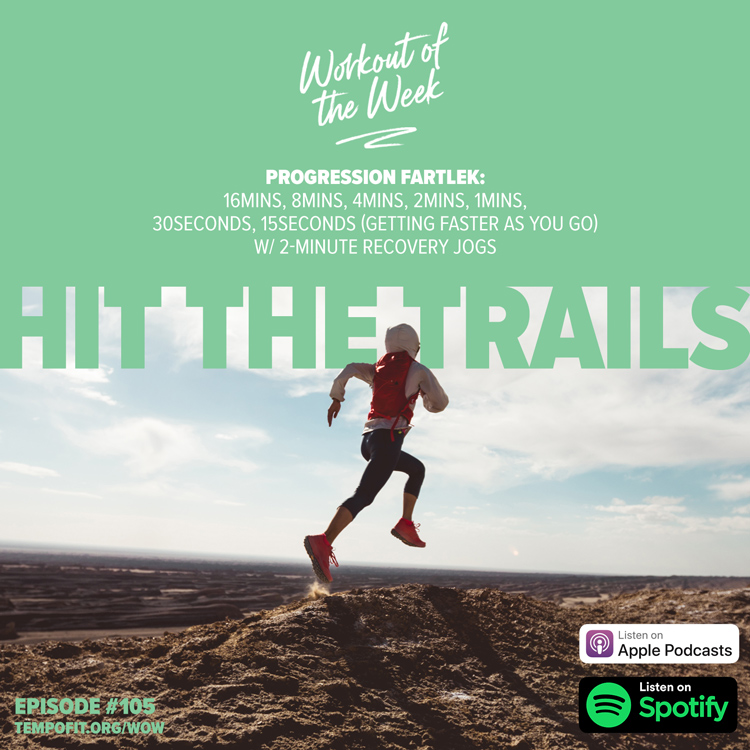
This fartlek session starts slow and long and finishes fast and short. It can be adapted whatever training cycle you’re in and is fun, free and also numerically pleasing!
WHAT?
PROGRESSION FARTLEK
16mins, 8, 4, 2, 1, 30s, 15s (getting faster as you go)
w/ 2min recovery jogs
Terrain: Undulating trails w/ somewhere flat for the final two efforts.
The duration of efforts halves each time, but you’ll also increase your speed each time. Most people will want to start about marathon race effort for the 16 minutes, then half marathon effort for the 8 minutes, 10k for the 4, 5k for the 2, and 3k for the 1 (finishing the 30 seconds and 15 seconds at about mile-to-800m race effort).
But feel free to adapt these paces to suit your training and goals and also to keep the freedom to run how you feel on the day.
WHY?
Fartlek workouts allow us the freedom to not worry what the watch is saying but to dial ourselves into how our bodies are working and free ourselves up to just have fun with the running.
By getting faster and faster, we’re teaching our bodies and mind to backend the efforts of our runs and races. So be sure to focus on great technique as things start to heat up towards the end.
HOW?
Find an undulating trail to do this session on. Also, keep in mind that you will want to do the final two efforts (the fast 30- and 15-second efforts) with a good surface underfoot and without hills.
This is a long workout (44 minutes when you include the recoveries and well over an hour with warm ups and warm downs) so treat it like a medium-long run or even your long run for the week. And you may like to do a shorter warm up (than our typical recommendation of 15 minutes or more jogging) as you have a full 16 minutes at marathon race effort anyway to add to that warm up.
THOUGHTS FOR THE WEEK:
ON RUNNING & LIFE
By Hayden Shearman
Running is a wonderful metaphor for life. And it’s great to remind ourselves of the lessons we learn in running and look for ways to apply those lessons to the rest of our lives. So, here are five lessons I’ve picked up (or had dealt to me!) in running that have some pretty epic learning points for life.
- Delayed Gratification: Man, food tastes soooooo good after a big workout or long run. When you’ve done the work and your body is crying out for calories, it feels so good to sink your teeth into something delicious. And, of course, the delayed gratification of running extends beyond food, to training stress and adaptation, to doing your rehab exercises from the physio, to getting stronger or more flexible in the gym. In the famous words of Oprah Winfrey, in running “you get out of it what you put in.”
- Start Early: I know there are many runners out there who prefer running at night (I even know a runner who prefers to run after midnight!), but for me, I get my best exercise done before lunch and preferably before breakfast. I’m roughly the same with work as well. Nailing those hours before lunch are key for clearing through my to-do list for the day.
- Goal Setting: I know, in today’s Covid world, it’s very hard to set running goals. But remember the days when you would book your international marathon up to 18 months out and then set about building a plan to get to that start line in the best shape possible? Running truly is the epitome of learning how to set goals, make plans and build habits to get out there and crush it.
- Things Go Wrong: Of course, even the best plans encounter the proverbial hitting the fan. Every runner who has been injured or had a race cancelled (thanks again, Covid) or who’s got sick in taper week, understands how you need to be adaptable, to reassess, plan again and make the most of what you’re given. It’s this combo of goal-setting/planning and the flexibility/positivity to adapt that makes the most successful runners (and the most successful humans).
- Processes: Results in running—whether they’re finish times or places or completions of a certain distance—are just the façades, the pretty little coverings, to mountains of processes, habits and lifestyle changes. Let’s take the 5k for example. A 1-minute improvement might represent 100s of hours of training, 1000s of kilometres, impressive increases in strength and mobility in the gym, improved basic speed from drills and technique work, improvements in diet, regulated sleep, getting up earlier, going to bed before 10, less parties and indulgences, hiring a coach, visiting the physio more often, improving your mental health and psychological tactics in training and racing … in short, running is all about staying focused on the processes, knowing that, if you get those right, the results will eventually come. Exactly like life!
Podcast (workout-of-the-week): Play in new window | Download
Subscribe: Apple Podcasts | RSS | More



